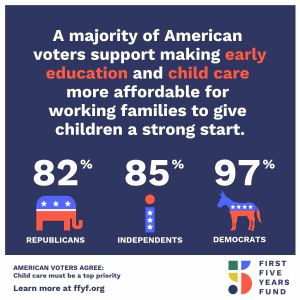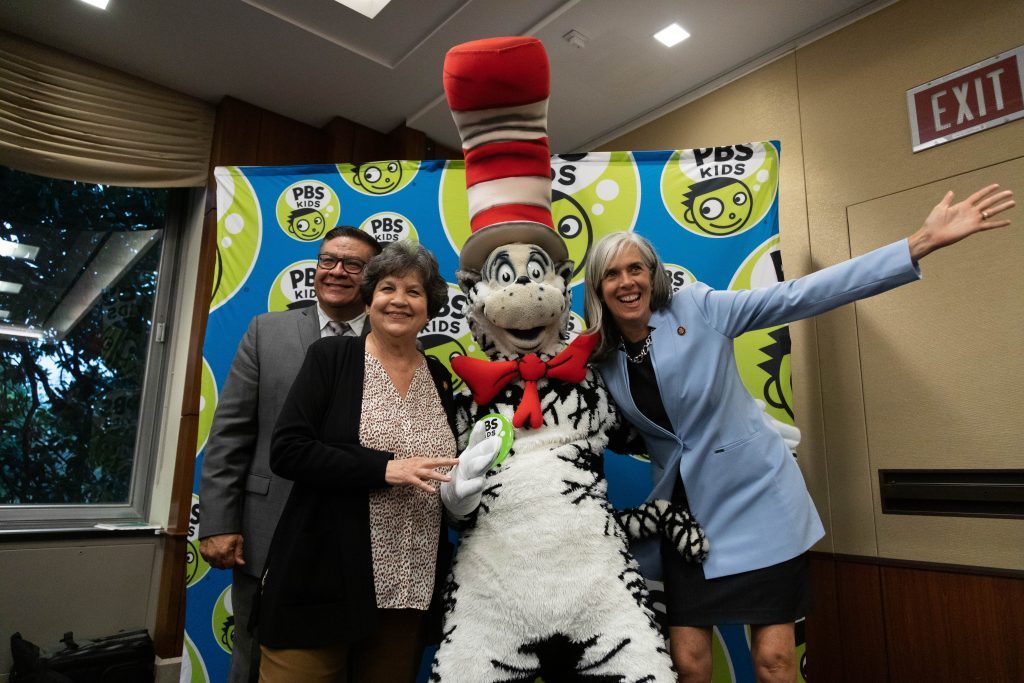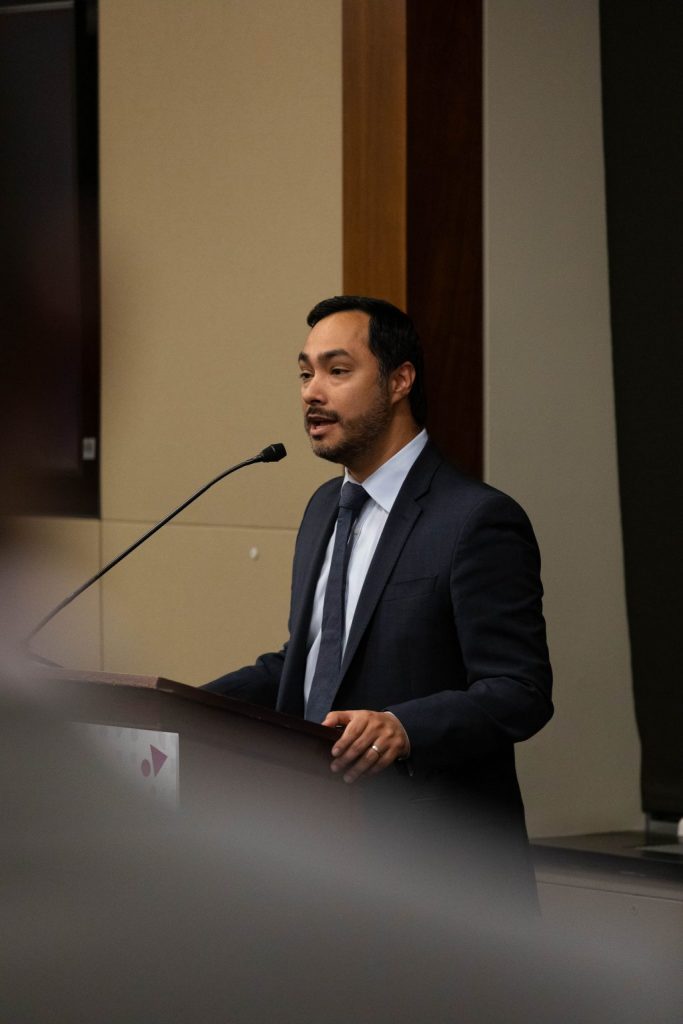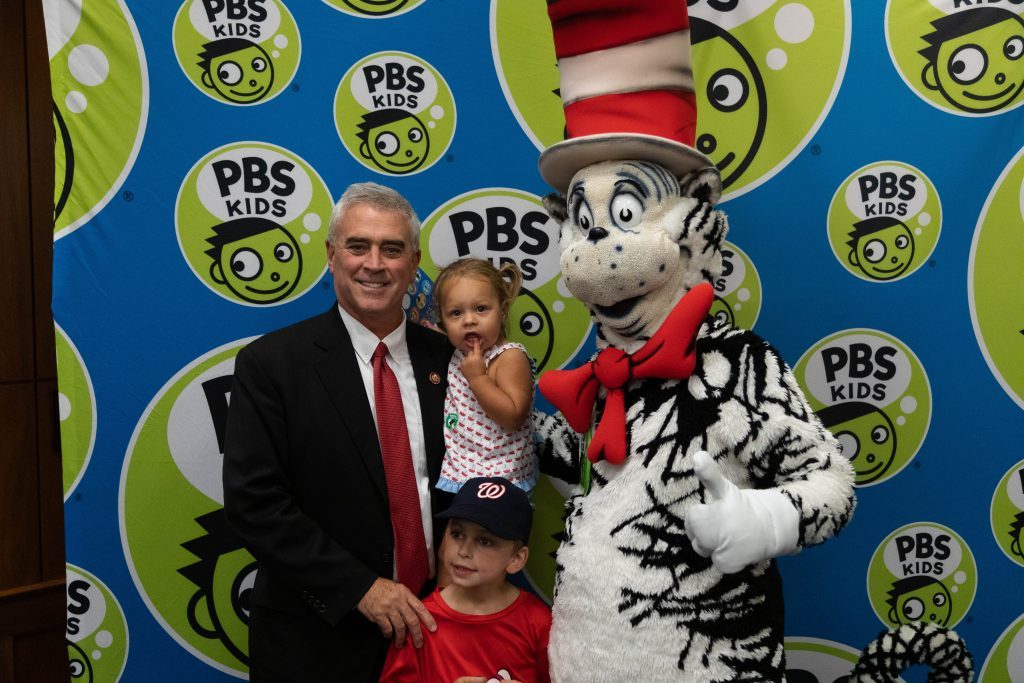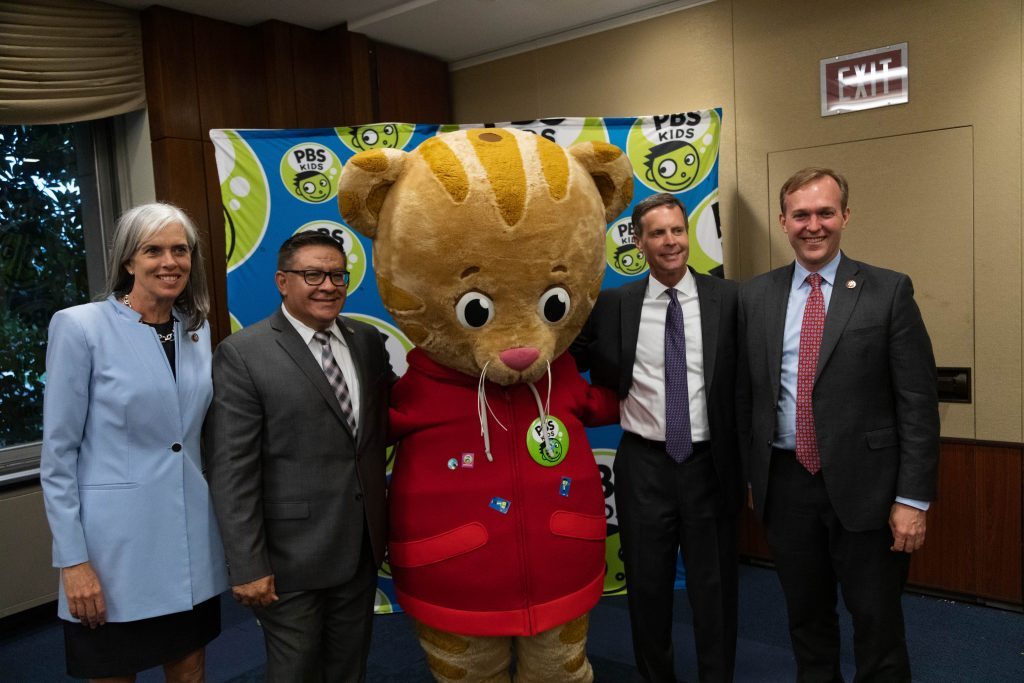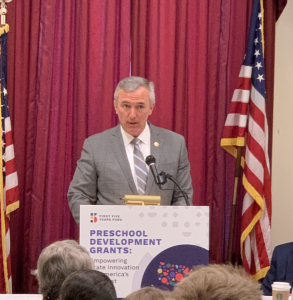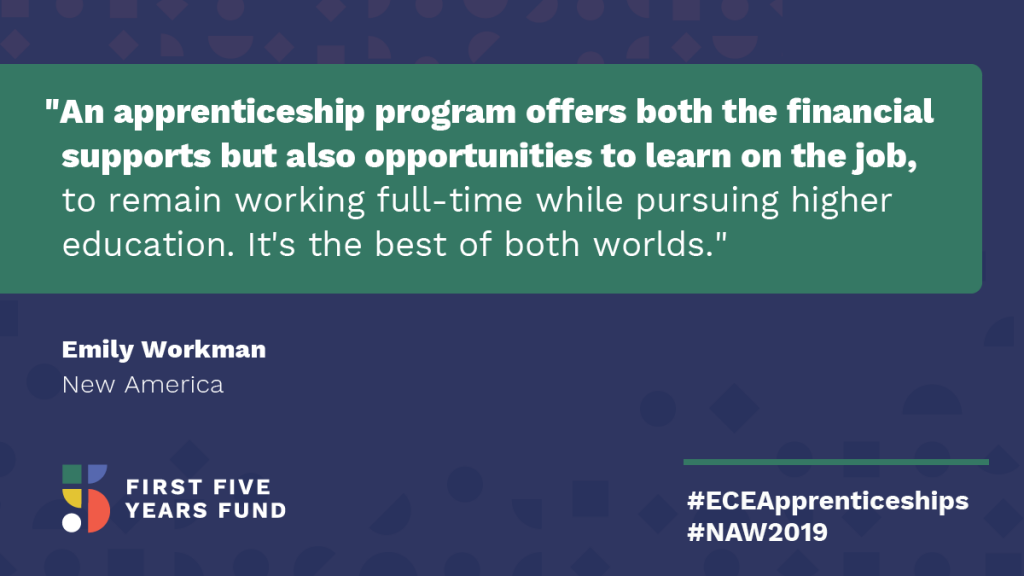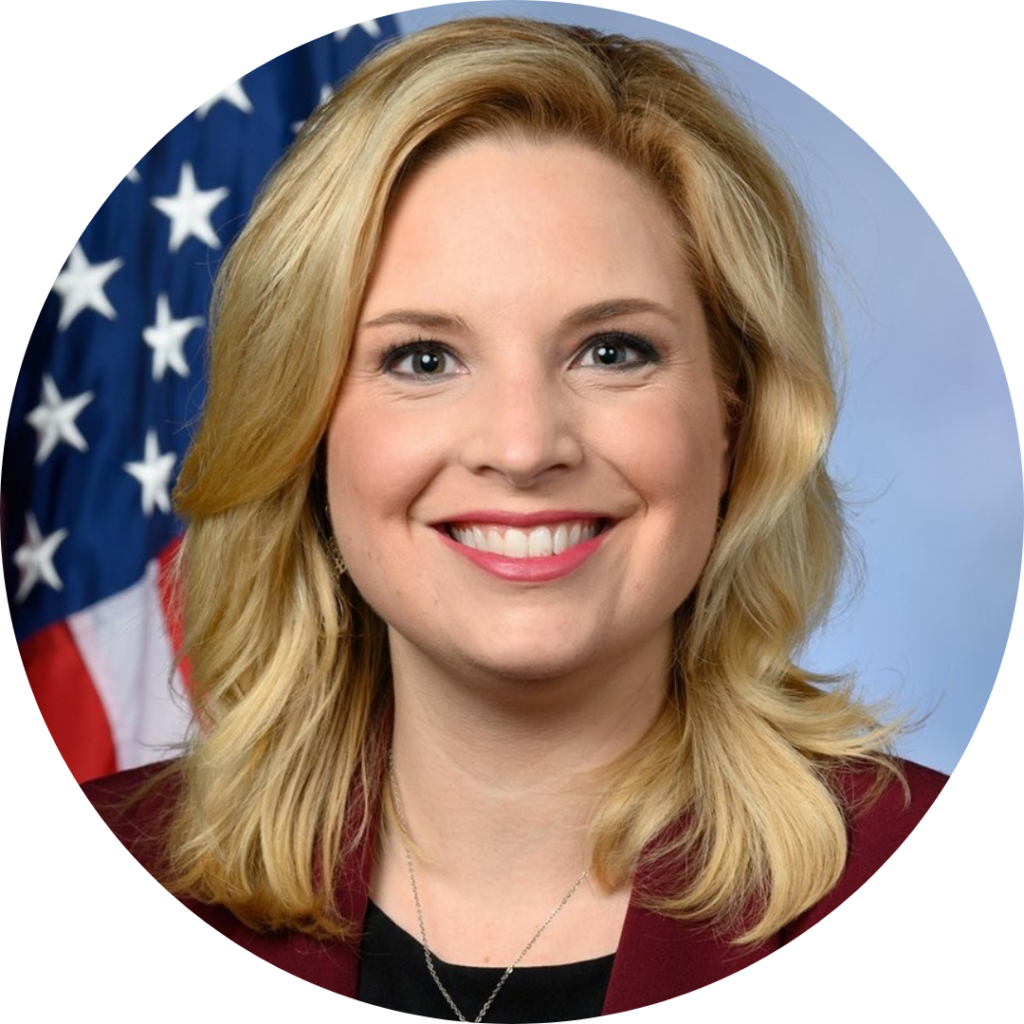FFYF’s Top 10 Early Learning & Care Moments from 2019
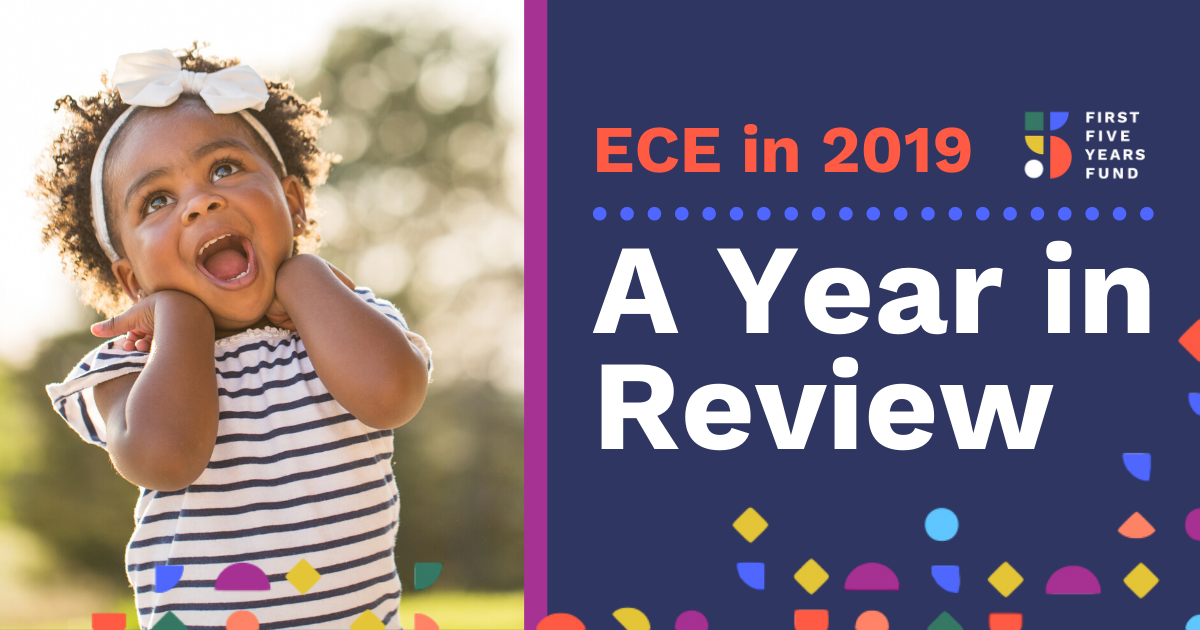
As we reach the end of a decade, it’s time to look back at some of 2019’s biggest accomplishments for early learning and care.

Take a look at FFYF’s top 10 ECE moments from 2019!
1. A New Congress
2019 brought the beginning of a new Congress, one in which Democrats would control the House and Republicans would control the Senate. Yet even with power split between the two parties in the legislative branch, FFYF knew that early learning and care would continue to be a priority among lawmakers on Capitol Hill. In the days leading up to the beginning of the 116th Congress, FFYF developed a set of legislative priorities for Congress that included key areas through which lawmakers might advance early childhood programs and initiatives. Included in that agenda was a recommendation for Members to not only double down in their support for existing programs like CCDBG, Head Start & Early Head Start, and Preschool Development Grants, but also develop new and innovative solutions to the problems faced by American families.
FFYF also welcomed members of the 116th Congress to Washington with a video ad highlighting the bipartisan support for early learning and care!
2. New National Poll: Stand Up for Kids, Don’t Stand Your Ground on Party Lines
In January of this year, FFYF released the results of our annual national poll. Conducted in the days immediately following the 2018 midterm elections, this year’s poll results demonstrate that voters not only support investments in ECE, but also expect their elected representatives to work across the aisle to develop solutions supporting early learning and pass meaningful legislation, despite partisan differences in a divided Congress.
Across all political ideologies, one thing is clear — Americans see a critical lack of quality, affordable ECE, regardless of their income level. One of the ways they would like this issue to be addressed is by providing greater support to programs like Head Start and Early Head Start with a whopping 80% of voters in favor of increased funding.
This poll is the latest in years of findings demonstrating a consistent desire among Americans, of both parties, for innovation and investment in high-quality ECE opportunities.
3. Bipartisan Pre-K Caucus Grows on Capitol Hill
Lawmakers have continued reaching across the aisle to have meaningful conversations surrounding the importance of federal investments in early learning programs. In September, FFYF co-hosted a kick-off celebration on Capitol Hill with the bipartisan Congressional Pre-K Caucus, in partnership with PBS Kids, which featured remarks from the Republican and Democratic caucus co-chairs and other Congressional leaders, as well an appearance from a few friends at PBS Kids. The Congressional Pre-K Caucus was first launched in April 2016 with the aim of fostering bipartisan and comprehensive dialogue among lawmakers on early education. The Caucus continues this mission with events like this one, bringing together members of Congress, staff, and their children to promote early learning. The co-chairs of the caucus are Representatives Tom Cole (R-OK-4th), Katherine Clark (D-MA-5th), Joaquin Castro (D-TX-20th), and Rodney Davis (R-IL-13th).
As stated by Congressman Castro, the Caucus’ ultimate mission is to “increase awareness of the many benefits early education yields, energize conversations on the Hill and throughout our communities on access to Pre-K, and identify policies and legislation that improve learning in those pivotal years for all of our children.”
This year, 9 new members from across the aisle joined the caucus; Representatives Cathy McMorris Rodgers (R-WA-15th), Tom O’Halleran (D-AZ-1st), Salud Carbajal (D-CA-24th), Ann Wagner (R-MO-2nd), Steve Stivers (R-OH-15th), Mike Turner (R-OH-10th), John Moolenaar (R-MI-4th), Jason Smith (R-MO-8th), and Denver Riggleman (R-VA-5). . These new members will contribute to the important conversations surrounding early education to ensure more of our nation’s children have access to high-quality, affordable early learning opportunities.
4. States Make Plans with Preschool Development Grants
The Preschool Development Grant Birth through Five program (PDG B-5) is a $250 million, competitive federal grant opportunity designed to provide federal funding to states as a way to strengthen their own early learning programs and systems. Last year, 46 states and jurisdictions were awarded initial grants to conduct a needs assessment and then create a strategic plan for their early learning systems. The awards for these initial “planning grants” ranged from $538,000 and $10.6 million.
November of this year marked the deadline for states to apply for “renewal grants” that would help fund implementation efforts based on their plans. Grant awards are expected to be released by December 31, 2019. Jurisdictions that did not receive initial planning grants in 2018 were also eligible to apply for separate initial grants in November 2019.
The renewal grants are meant to build on the work that states accomplished during year one, and will assist states in the coordination of their existing early childhood services and funding streams in order to serve more children effectively in the mixed delivery system.
In a letter to the Administration for Children and Families (ACF), FFYF joined with advocates to provide recommendations concerning the PDG B-5 program Year 2 Funding Opportunity Announcement (FOA). The recommendations for the Year 2 FOA are focused on ensuring grant funds are used to support long-term, systemwide improvements. Specifically, the letter recommends robust technical assistance to states, engagement with a diverse group of stakeholders, and clear communication surrounding funding levels when possible.
Earlier in the year, FFYF also hosted a bipartisan briefing on Capitol Hill in conjunction with the offices of Representatives Joaquin Castro (D-TX-20) and John Katko (R-NY-24) to discuss the benefits of the PDG B-5 with Congressional staff. In his remarks at the briefing, Rep. Katko announced a bipartisan “Dear Colleague” letter he lead with Rep. Castro, and encouraged Members of Congress to cosign the letter to the Appropriations Committee requesting a substantial funding increase for the PDG B-5 program. 81 Democrats and Republicans signed the letter, and PDG funding was increased by $25 million at the end of the year.
The PDG B-5 program continues to be an innovative bipartisan program that fosters innovation at the state and local level through a strong partnership with the federal government.
5. 2020 Candidates Focus on Early Learning & Child Care
Throughout the year, as Presidential candidates have rolled out policy proposals and agendas, a key component of many has been expanded access to quality, affordable child care and Pre-K. Candidates have consistently acknowledged the short- and long-term benefits of ECE for both children and families. The majority of Democrats, Republicans, and Independent voters agree that funding for key child care programs should be expanded. The more discussion of how these programs help American families, the better.
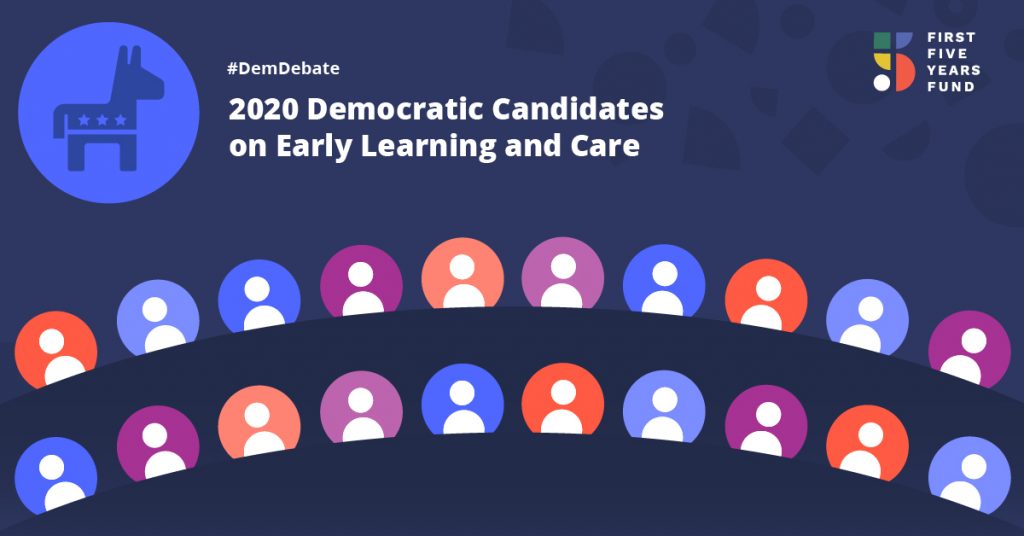
Ahead of the July Democratic debate, FFYF compiled various statements on early learning and care from the candidates who would be appearing on the debate stage. While certainly not representative of the totality of their history or positions on the issue, we are glad that virtually every single person running for president on both sides of the aisle has put forth a plan to help working families access high-quality child care and that this important issue has become a major priority for candidates of both parties.
6. The State of the States
As support for ECE grows across the country, it’s important to understand how states craft their early learning systems. That’s why this summer, FFYF created state fact sheets to share updated information on early learning nationwide.
This analysis provides a high-level overview of the various early learning and care opportunities that exist within states, including those made possible with federal funding. Together, federal and state investments and partnerships create opportunities for success for millions of children. FFYF developed a fact sheet that provides a national overview of early learning and care, online here.
What’s more, a majority of governors across the country used their 2019 State of the State addresses as an opportunity to highlight their state’s commitment to, and investment in, early childhood education. Overall, a bipartisan group of 26 governors discussed early learning and care plans and opportunities in their states during their speeches.
7. Landmark Studies Support Home Visiting Success
Parents are a child’s first and best teacher, and voluntary home visiting programs, like those made possible by MIECHV, pair families who often have limited support and resources with trained home visitors such as nurses, social workers, and educators. Home visitors meet with parents in their homes from pregnancy through their child’s kindergarten entry to help lay the foundation for the health, education, development, and economic self-sufficiency of the entire family. Visits by caring, experienced professionals can turn good intentions into good parenting, breaking generations-long cycles of poverty, addiction, abuse, and despair,
In 2019, two new major studies published by the American Academy of Pediatrics in November revealed astonishing long-term health, academic, and economic benefits of voluntary home visiting through the Nurse-Family Partnership for children born into poverty. The observed program “led to lower public spending and better cognitive outcomes for their children at the time they reached adulthood.”
The development and implementation of voluntary, evidence-based home visiting programs support at-risk families that could benefit from the resources provided by experts in a more personal setting.
8. Major Uptick in Early Learning & Care Legislation
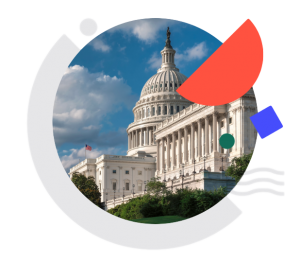
At the beginning of the 116th Congress, FFYF developed a set of legislative priorities for Congress that included key areas through which lawmakers might advance early childhood programs and initiatives. Included in that agenda was a recommendation for Members to not only double down in their support for existing programs like CCDBG, Head Start and Preschool Development Grants, but also develop new and innovative solutions to the problems faced by American families.
In 2019 alone, Republicans and Democrats alike have introduced nearly 150 bills, big and small, that would strengthen and expand early learning opportunities – nearly double the number introduced or proposed during the two years of the 115th Congress.
FFYF has developed an online tracker for the early childhood legislation introduced in the 116th Congress, which provides up-to-the-minute information about actions taken in Congress, co-sponsorships, and more.
9. Expanding Registered Apprenticeships for the Early Learning Workforce
A vital component of providing high-quality early learning and care is having well-qualified early childhood educators. Currently, there are significant shortages in the ECE workforce and cost barriers for many who seek to enter or advance in the field. One way to address this issue is through ECE Registered Apprenticeship programs, which offer “earn as you learn” opportunities to individuals, while also allowing employers to improve the quality and effectiveness of their workforce.
In November, FFYF celebrated National Apprenticeship Week to honor the efforts being made to provide high-quality early learning and care through the training of a well-qualified workforce.
States that have state-funded ECE apprenticeship programs have seen success in working with communities, creating opportunities for growth, and increasing the quality of early learning and care in the region. For these programs to be successful, state and federal governments, community leaders, philanthropic organizations, and higher-education institutions must work together. Supporting providers and future educators is paramount to improving the quality of, and expanding access to early learning.
10. Major Funding Increases for Early Learning & Care Programs
Earlier this week bipartisan leaders of the House and Senate appropriations committees released the details of the FY2020 government spending bill to fund the government through the remainder of the fiscal year. Included in the legislation is over $1 billion in increases to federal early learning and care programs, including a $550 million increase for the Child Care and Development Block Grant (CCDBG) program and a $550 million increase for Head Start & Early Head Start. CCDBG previously received another historic funding increase for FY2018 ($2.37 billion over FY2017 levels) as part of a bipartisan budget deal negotiated by Senate Majority Leader Mitch McConnell and Minority Leader Chuck Schumer.
Support for early childhood education remains overwhelmingly bipartisan, both among voters and lawmakers. FFYF has compiled the various “Dear Colleague” letters from earlier this year related to funding for early childhood education in FY2020 appropriations. This year there were 5 letters that garnered 269 signatures from Republicans and Democrats in the House and Senate calling for robust funding for specific programs.
Earlier this year at a roundtable event with HHS Sec. Alex Azar and White House advisor Ivanka Trump — part of a nationwide child care listening tour — Senate Appropriations Labor-HHS Subcommittee Chair Roy Blunt (R-MO) discussed the need for continued bipartisan support for CCDBG. “Access to affordable, high-quality child care is critical for working families, so parents can go to work knowing their child is safe & receiving developmentally appropriate care & early learning opportunities. But for many families, this is a serious challenge. As chairman of the appropriations subcommittee that funds @HHSgov, I’ve been proud to support significant increases for the Child Care & Development Block Grant,” Sen. Blunt later tweeted.
Other Republican and Democratic leaders from Capitol Hill joined governors and business leaders from across the country for the White House Summit on Child Care and Paid Leave last week. Then, days later, Congress unveiled the FY2020 funding bill, in which child care and early learning were among the few bipartisan priorities to receive such important funding increases.
FFYF has been proud to work with our partner organizations throughout the year on advocating for crucial funding increases in Congress – including through a collaboration with NAEYC, Bipartisan Policy Center, the Center for American Progress, and Child Care Aware of America, to bolster current and ongoing efforts to help states across the nation maximize the recent and historic increase in federal child care funding provided by Congress. Learn more about the effort by visiting the partnership website: www.stateofchildcare.org and check out a video FFYF created for the effort featuring a Washington, DC family who is thriving, thanks to CCDBG!
Looking Ahead
In 2020, FFYF is excited to work with our advocacy partners, as well as new and existing allies on Capitol Hill, to continue expanding its investment in high-quality early childhood education. Without question, the care and education of children from birth through age five will be in the national spotlight over the coming months – particularly as the 2020 elections continue to heat up. Stay tuned for the latest and greatest in ECE with updates from FFYF!
Follow us on Facebook!
Follow us on Twitter!
Subscribe to receive our Daily News Clips.
Subscribe to our Weekly Newsletter and other News Alerts!

Subscribe to FFYF First Look
Every morning, FFYF reports on the latest child care & early learning news from across the country. Subscribe and take 5 minutes to know what's happening in early childhood education.
